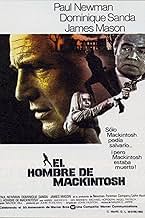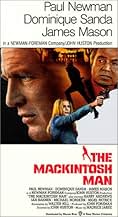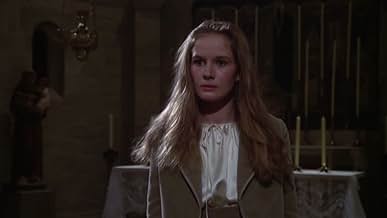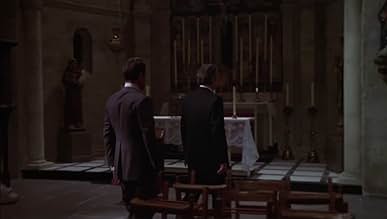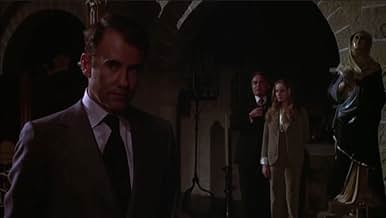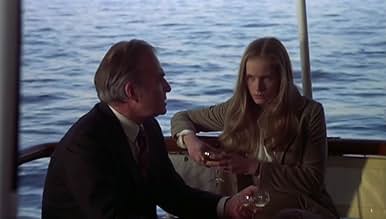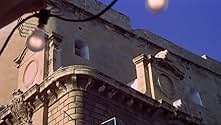A member of British Intelligence assumes a fictitious criminal identity and allows himself to be caught, imprisoned, and freed in order to infiltrate a spy organization and expose a traitor.A member of British Intelligence assumes a fictitious criminal identity and allows himself to be caught, imprisoned, and freed in order to infiltrate a spy organization and expose a traitor.A member of British Intelligence assumes a fictitious criminal identity and allows himself to be caught, imprisoned, and freed in order to infiltrate a spy organization and expose a traitor.
Featured reviews
Perhaps the problem is that, after years of James Bond movies and various Cold War thrillers, too many of the film's elements have simply been done before and done better, and the ominous feeling of déjà vu is too immense for the film to survive. Or maybe the problem is that we expect a lot more from a director with clout of John Huston, who seems to take a strangely apathetic approach to the material which makes the film's recycled elements feel even more trying. For whatever reason, the film never seems to grip us in the way a good thriller is supposed to. As a whole, THE MACKINTOSH MAN is a fine film for a rainy evening, but it stands as not only a wasted opportunity, but also as possibly the least distinctive film of director Huston.
The plot and story line is developed nicely by Mr. Huston, who takes us on a European tour that starts in London, then works its way to Ireland and finally to Malta. James Mason does his usual yeoman's job in his rendition of the pompous Sir George Wheeler, the right wing politico big wig who may have his own share of illegal dalliances. Although Mr. Newman is, in fact, the main character, the entire cast comes across very well as more of an ensemble effort, with no one role really outdoing another. It seems that Mr. Huston lent his directorial hand very deftly when it came to letting the film itself be the focal point rather than just one or two actors hogging the spotlight. Not a well known film, perhaps, but one that deserves viewing nonetheless, due in no small part to a most interesting conclusion.
Another parallel can be seen in the casting. Besides Newman himself, there is Huston's selection of the mysterious Dominique Sanda, one of Europe's most sensuous stars, whose appeal mirrors Hitchcock's obsession with the cool blonde beauty of Grace Kelly, Eva Marie Saint or Tippi Hedren.
Then, too, we have the eloquent James Mason in a late role commanding the opening of the film in the House of Lords by holding forth in the grand manner. But we should guess that he is here a Hitchcockian anti-hero, one in the mold of Phillip Vandamm from Hitch's monumental "North by Northwest." More parallels could be drawn, but for the mise-en-scene, Huston does one up on Hitch by actually filming in Ireland and Malta.
As for the plot it appears to have the tempting multilayered complexity of a typical English thriller, such as those in which Michael Caine appeared before he was swallowed up by Hollywood. If there are plot densities, we are after all, dealing with agents and double-agents, and things can get knotted up. In what other country than England could upperclass spies -- traitors-- be celebrated in literature and movies like the agents Philby or Blunt? Newman's adversaries are gentlemen, but not what they seem to be. We even get an idea of what an English prison is like and the quantities of laundry that they do. Last of all, who is Mrs. Smith? A name deliberately chosen for its opaqueness. Is she convincing as Mackintosh's daughter, or is she merely an agent, and not even a double agent? Yes, there are holes in the plot, but overall, the performances and Newman's Great Escape make up for the plot weaknesses.
Of four ****, three and a half. Still a must for fans of the director Huston, or the stars Newman, Mason or Sanda, and the many supporting stalwarts of British b/w postwar movies and Masterpiece Theatre productions.
The first act is rather stale. John Huston directs the material in a standard manner. The trial is boring. It would have worked much better to start with Newman arriving in prison. His intelligence background should be revealed much later as a shocking twist. The pacing and plotting is rather slow and methodical. It is competently made and it has the great Paul Newman. It's well into the second half when they finally have a car chase. Otherwise, the drama is rather limited.
Did you know
- TriviaIn his autobiography, cinematographer Oswald Morris recalled how John Huston showed very little interest or enthusiasm for directing this movie and would arrive late on-set, largely unprepared for the day's schedule. It often was left to Morris and the crew to fill the gap and set up the shots for the day for when Huston eventually arrived and also to help Paul Newman, who also was disappointed by Huston's attitude.
- GoofsReflected in the side window of the truck when Rearden drives off to meet the airplane at the airfield.
- Quotes
Slade: [musing poetically] I'm going home.
[quoting poetry]
Slade: 'Sleep after toil, port after stormy seas, ease after war, death after life does greatly please.'
Joseph Rearden: [laconically] I don't know about you, Slade; I'm not ready for death. The rest I'll drink to.
- Alternate versionsUK theatrical release was cut for violence to secure an AA rating with heavy edits to the beating of Reardon and shots of Gerda being kicked and hit with a gun. All later video and DVD releases are uncut and 15 rated.
- ConnectionsReferenced in Magnum Cop (1978)
- How long is The MacKintosh Man?Powered by Alexa
Details
- Release date
- Countries of origin
- Language
- Also known as
- El emisario de Mackintosh
- Filming locations
- Kilmainham Jail, Dublin, County Dublin, Ireland(where Reardon is imprisoned)
- Production companies
- See more company credits at IMDbPro
Box office
- Gross US & Canada
- $3,300,000
Contribute to this page



